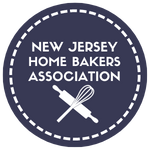How do I get a Cottage Food Permit?
To apply for a Cottage Food Operator License, you do so through the New Jersey Department of Health.
How and Where You Can Sell and Advertise.
- Clients may pay for and pick up their items at your home in NJ
- You may deliver and accept payment for items at your clients’ homes in NJ
- You may deliver to a NJ event venue and accept payment directly from the client or their pre-
determined agent (such as a wedding planner or family member) - You may sell your items directly at farmers’ markets and pop-up retail events within New Jersey
- You must display a placard with your Cottage Food Operator Number and the
disclaimer, “This food is prepared pursuant to N.J.A.C. 8:24-11 in a home kitchen that
has not been inspected by the Department of Health.” - You may sell your goods to people with whom you have a direct relationship (friends, family,
co-workers, etc.) - You may use the internet to advertise, accept orders and payments, and correspond with clients
- You may use the USPS or other commercial carriers to deliver non-food promotional items like
flyers and coupons (Reminder: You cannot ship the goods themselves.)
How and Where You Can’t Sell and Advertise.
- You may not sell your items indirectly via wholesale or retail/resale agreement with a third party. You cannot have products in stores.
- You may not sell your items across state lines (no delivery or markets outside of New Jersey – no matter how close to the state line the client is)
- You may not ship your items via the USPS nor any other commercial carrier
- You may not offer goods for immediate consumption in your home, beyond sampling for client
consultations (specifically, your home is NOT to be treated as a sit-down bakery or food
establishment) - You may not deliver goods to anyone other than the client or their pre-determined agent
What does “non-TCS”- mean?
TCS and non-TCS refer to “temperature-controlled for safety.” Broadly, this means any foods that do not require additional preparation or initial refrigeration. Yes, we know that many of you refrigerate your goods to maintain shape and appearance, but this is an aesthetic choice, not because of safety.
Scientifically, TCS and non-TCS foods have a specific moisture content that defines which category they fall into.
If I use a commercial kitchen, do wholesale distribution, and am insured and licensed, has anything changed for me?
No! You can continue to work out of a commercial kitchen under the current commercial regulations; the rule change only affects the addition of a set of cottage food regulations.
You may, of course, apply for a Cottage Food Operator’s license and move your business to your home, or just produce but then you will be governed by the home-producer regulations, which will limit where and how you can sell your goods.
Do all my goods require a label? What about samples?
Yes – you must always disclose with either a label or a placard the ingredients and allergens in your products- even if you are giving away samples or offering a client a tasting, such as for wedding cakes.
These labels and placards don’t need to be elaborate, but they do need to be present. This is as much for your own protection as that of the consumer. You don’t want anyone alleging that you’ve hidden allergens or falsely accusing you of substituting ingredients.
Does my kitchen need to be inspected before I begin selling my goods?
NO! There is no requirement for an initial Department of Health.
Do I have to pay taxes on my home-baking income?
Yes, if your income exceeds the minimum for income tax, you will have to pay taxes according to all applicable state and federal laws.
Many bakery items are not subject to sales tax in NJ, but you should
consult your accountant for guidance.
Is there an income cap for home-based baking businesses?
Yes, your gross income cannot exceed $50,000 from a home-based baking business.
What’s the best way to have my private well tested?
Many companies in New Jersey offer well testing for a fee, which can vary widely. We recommend shopping around to find the best price for the bacterial coliform test.
How long will it take for my application to be approved?
Based on the experiences of cottage food operators that have already received their permits, it could take anything between 2 to 8 weeks. The Department of Health updates the list of currently active cottage food operator permits when new permits are emitted.

